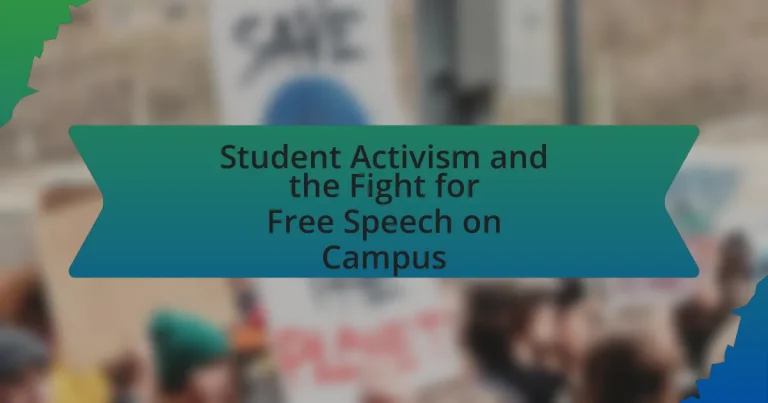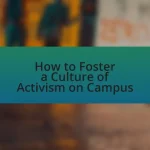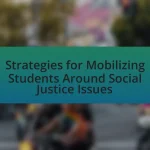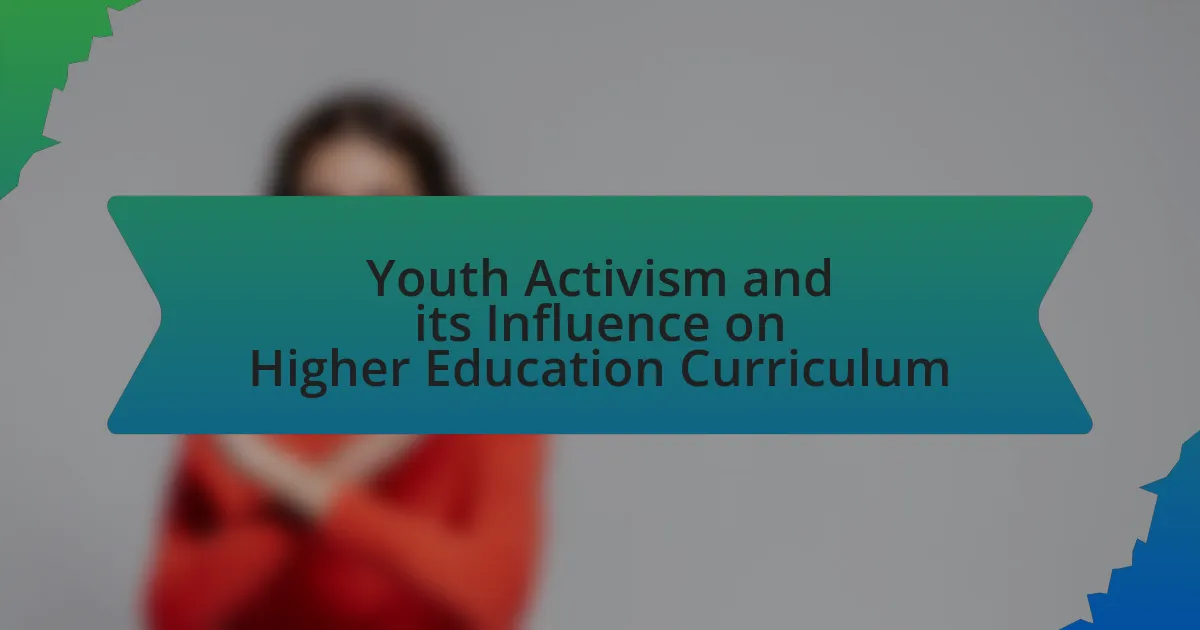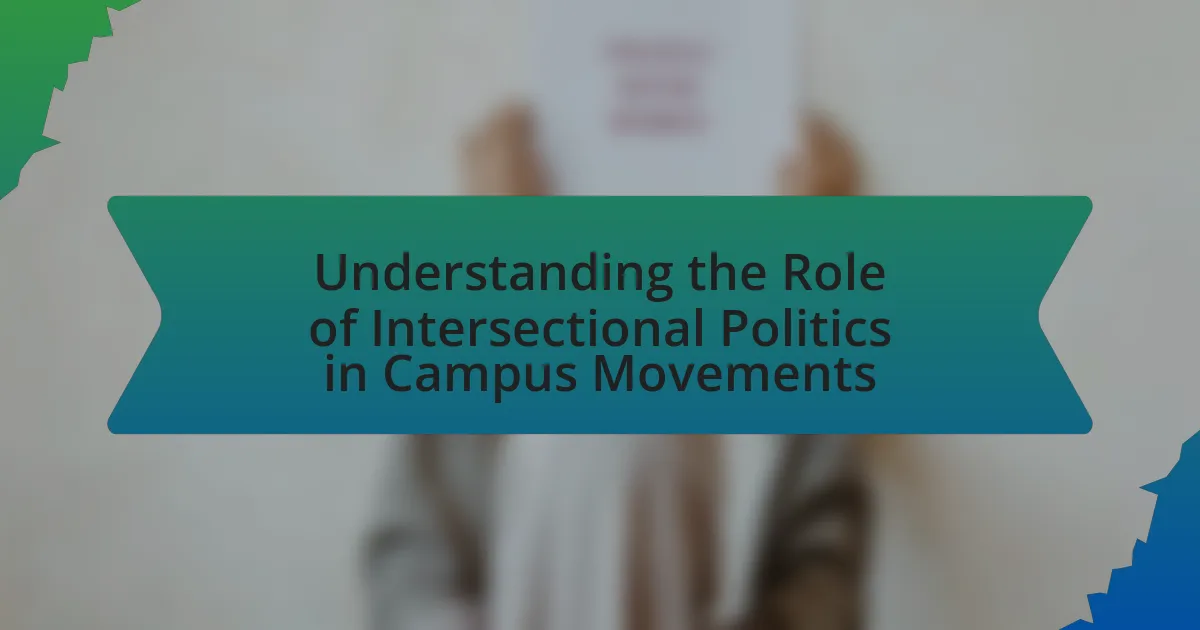Student activism encompasses the organized efforts of students advocating for social, political, and educational change, with a significant focus on free speech on campus. The article explores the historical influence of student activism on free speech rights, highlighting key events such as the Free Speech Movement at UC Berkeley and the Kent State shootings. It examines how different generations of students approach free speech issues, the importance of free speech in higher education, and the challenges students face in advocating for their rights. Additionally, the article discusses contemporary trends in student activism, the role of campus organizations, and strategies for effective advocacy, emphasizing the need for a balance between free expression and inclusivity in academic environments.
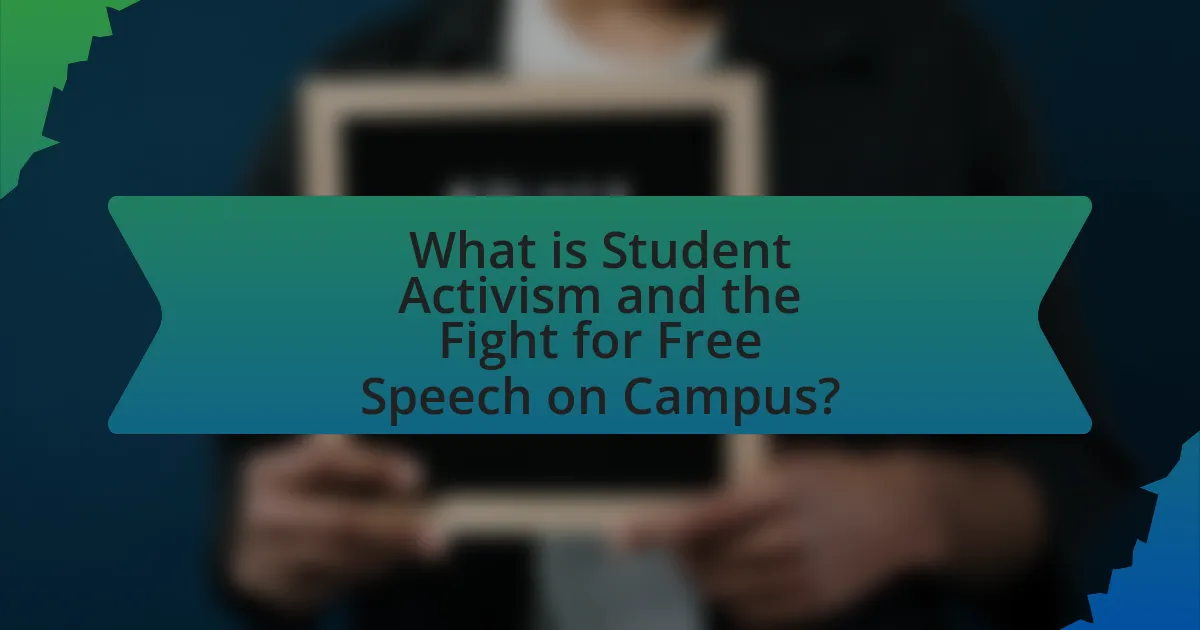
What is Student Activism and the Fight for Free Speech on Campus?
Student activism refers to the organized efforts of students to advocate for social, political, or educational change, often focusing on issues such as civil rights, environmental justice, and, notably, free speech on campus. The fight for free speech on campus involves students challenging restrictions on expression, promoting open dialogue, and opposing censorship, which has become increasingly relevant in the context of political polarization and debates over hate speech versus free expression. Historical instances, such as the Free Speech Movement at the University of California, Berkeley in the 1960s, exemplify the ongoing struggle for students to assert their rights to express diverse viewpoints without fear of retribution or suppression.
How has student activism historically influenced free speech on campuses?
Student activism has historically played a crucial role in shaping free speech on campuses by challenging administrative policies and advocating for the rights of students to express diverse viewpoints. For instance, the Free Speech Movement at the University of California, Berkeley in the 1960s mobilized students to protest against restrictions on political activities, leading to significant changes in university policies that expanded free speech rights. This movement not only influenced Berkeley but also inspired similar activism across the nation, resulting in the establishment of more open forums for student expression and the recognition of free speech as a fundamental right in academic settings.
What key events have shaped the landscape of student activism?
Key events that have shaped the landscape of student activism include the Free Speech Movement at the University of California, Berkeley in 1964, which established the principle of free speech on campuses. This movement arose in response to restrictions on political activities and set a precedent for future activism. Another significant event is the Kent State shootings in 1970, where four students were killed during a protest against the Vietnam War, galvanizing national outrage and increasing student activism across the country. Additionally, the Black Lives Matter movement has influenced contemporary student activism, particularly in advocating for racial justice and police reform on campuses. These events collectively highlight the evolution of student activism as a response to social and political issues, reinforcing the importance of free speech and civic engagement in educational environments.
How have different generations of students approached free speech issues?
Different generations of students have approached free speech issues with varying degrees of emphasis on inclusivity and the balance between expression and harm. For instance, students in the 1960s prioritized unrestrained free speech as a means to challenge authority and advocate for civil rights, exemplified by protests against the Vietnam War and the push for academic freedom. In contrast, contemporary students often advocate for free speech while simultaneously emphasizing the need to protect marginalized groups from hate speech and discrimination, reflecting a more nuanced understanding of the implications of free expression. This shift is evidenced by surveys indicating that a significant portion of current students support restrictions on speech that they perceive as harmful, highlighting a generational change in the perception of free speech as a tool for empowerment versus a potential source of harm.
Why is free speech important in the context of higher education?
Free speech is crucial in higher education because it fosters an environment where diverse ideas can be exchanged and debated. This exchange is essential for intellectual growth, as it allows students to challenge their beliefs and develop critical thinking skills. Research from the Foundation for Individual Rights in Education indicates that campuses with robust free speech protections see higher levels of student engagement and academic performance. Furthermore, the American Association of University Professors emphasizes that academic freedom, a component of free speech, is vital for the pursuit of truth and knowledge in academia.
What role does free speech play in academic freedom?
Free speech is fundamental to academic freedom as it enables the open exchange of ideas, critical thinking, and the pursuit of knowledge. Academic freedom relies on the ability of scholars and students to express diverse viewpoints without fear of censorship or retaliation, fostering an environment where inquiry and debate can thrive. Historical examples, such as the American Association of University Professors’ 1940 Statement of Principles on Academic Freedom and Tenure, emphasize that academic freedom includes the right to speak freely in the classroom and in research. This principle is essential for the development of innovative ideas and the advancement of society, as it allows for the challenge of prevailing norms and the exploration of controversial topics.
How does free speech contribute to a diverse learning environment?
Free speech fosters a diverse learning environment by allowing individuals to express varied perspectives and ideas. This expression encourages open dialogue, which is essential for critical thinking and understanding different viewpoints. Research indicates that campuses that prioritize free speech see increased engagement among students from diverse backgrounds, leading to richer discussions and a more inclusive atmosphere. For instance, a study by the Foundation for Individual Rights in Education found that students who feel free to express their opinions are more likely to participate in discussions that enhance their educational experience.
What challenges do students face in advocating for free speech?
Students face significant challenges in advocating for free speech, primarily due to institutional restrictions, social backlash, and the complexities of navigating diverse viewpoints. Institutional restrictions often manifest as policies that limit speech, such as speech codes or designated free speech zones, which can hinder students’ ability to express their opinions freely. Social backlash can arise from peers or faculty who may disagree with certain viewpoints, leading to a hostile environment that discourages open dialogue. Additionally, the presence of diverse viewpoints on campus complicates discussions, as students may struggle to balance the right to free speech with the need to respect differing opinions, potentially leading to conflicts and misunderstandings. These challenges are evident in various campus incidents where advocacy for free speech has resulted in protests or calls for censorship, highlighting the ongoing tension between free expression and community standards.
What are the common restrictions placed on free speech on campuses?
Common restrictions placed on free speech on campuses include policies against hate speech, limitations on disruptive behavior, and regulations regarding the time, place, and manner of speech. These restrictions aim to maintain a safe and inclusive environment for all students. For instance, many universities implement codes of conduct that prohibit speech deemed threatening or discriminatory, which is often justified by the need to protect the rights and dignity of individuals within the campus community. Additionally, time, place, and manner restrictions are frequently enforced to ensure that speech activities do not interfere with the educational process or disrupt campus operations.
How do social media and technology impact student activism?
Social media and technology significantly enhance student activism by facilitating rapid communication and mobilization. Platforms like Twitter and Instagram allow students to share information, organize events, and raise awareness about social issues in real-time, reaching a broader audience than traditional methods. For instance, the #BlackLivesMatter movement gained momentum through social media, with students using hashtags to unite and amplify their voices on campus and beyond. Additionally, technology enables the creation of online petitions and crowdfunding campaigns, further empowering students to advocate for change effectively. According to a study published in the Journal of Youth Studies, 70% of student activists reported that social media was crucial for their organizing efforts, demonstrating its vital role in contemporary activism.
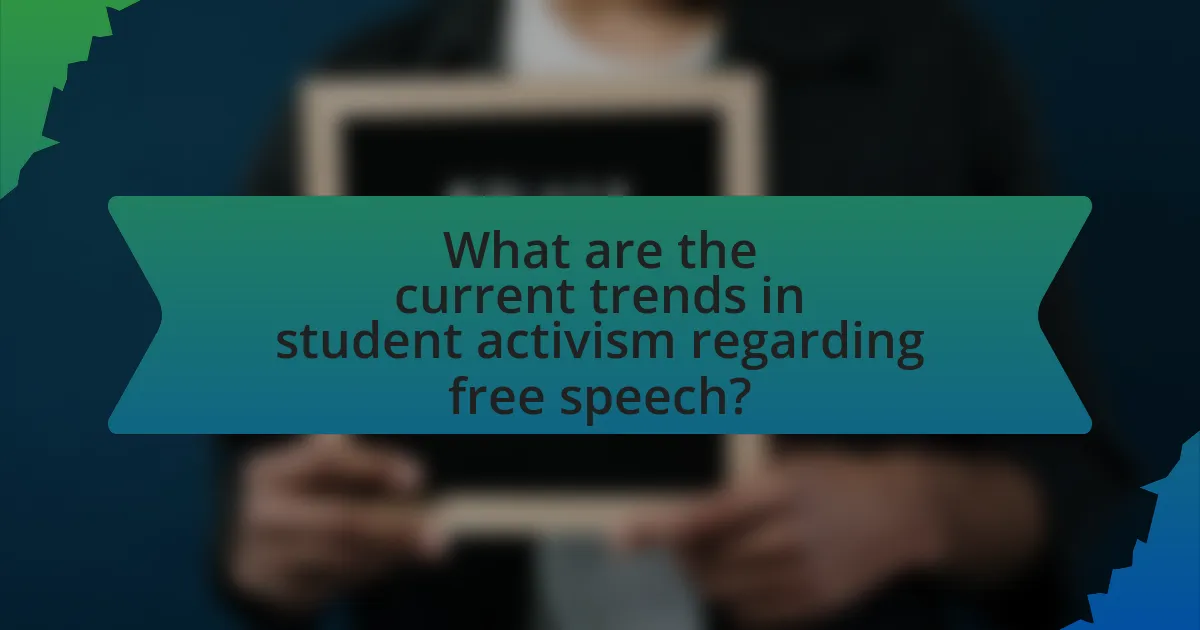
What are the current trends in student activism regarding free speech?
Current trends in student activism regarding free speech include a growing emphasis on protecting diverse viewpoints while addressing concerns about hate speech and misinformation. Students are increasingly advocating for policies that promote open dialogue and free expression, often organizing events and campaigns to highlight the importance of these principles. For instance, a 2022 survey by the Foundation for Individual Rights in Education found that 73% of students believe that colleges should allow controversial speakers on campus, reflecting a desire for robust discourse. Additionally, movements such as “Free Speech Week” have gained traction, encouraging students to engage in discussions about the balance between free speech and community safety. These trends indicate a nuanced approach to free speech, where students seek to uphold their rights while fostering an inclusive environment.
How are contemporary movements shaping the conversation around free speech?
Contemporary movements are significantly shaping the conversation around free speech by advocating for inclusivity and challenging traditional norms. For instance, student activism has emerged as a powerful force on campuses, where groups like Students for Justice in Palestine and various organizations have raised awareness about the need for diverse voices and perspectives. These movements often argue that free speech should not only protect popular opinions but also marginalized viewpoints, leading to debates about the limits of expression and the responsibilities that come with it. Research from the Foundation for Individual Rights in Education (FIRE) indicates that 80% of students believe that campus climate stifles free speech, highlighting the tension between activism and traditional free speech principles. This evolving dialogue reflects a broader societal shift towards recognizing the complexities of free expression in a diverse environment.
What specific issues are students currently advocating for?
Students are currently advocating for issues such as free speech rights, mental health resources, diversity and inclusion initiatives, and climate action on campus. These advocacy efforts are driven by a desire to create an environment where all voices can be heard, particularly in the context of controversial topics. For instance, a survey conducted by the Knight Foundation in 2022 revealed that 60% of students believe that free speech is essential for a healthy campus environment. Additionally, students are pushing for increased mental health services, as reported by the American College Health Association, which found that 63% of college students experienced overwhelming anxiety in the past year. This advocacy reflects a broader trend of students seeking systemic changes to address their needs and concerns within educational institutions.
How do intersectionality and identity politics influence student activism?
Intersectionality and identity politics significantly influence student activism by shaping the priorities and strategies of movements. Intersectionality recognizes that individuals experience overlapping social identities, such as race, gender, and class, which affect their experiences of oppression and privilege. This framework encourages student activists to address multiple forms of discrimination simultaneously, leading to more inclusive and representative movements. For example, the Black Lives Matter movement, which emerged from intersectional activism, highlights the unique challenges faced by Black students and advocates for systemic change in educational institutions. Research by Crenshaw (1989) emphasizes that understanding these intersecting identities is crucial for effective advocacy, as it allows activists to create coalitions that address the diverse needs of marginalized groups. Consequently, identity politics mobilizes students around shared experiences and fosters solidarity, enhancing the impact of their activism on campus and beyond.
What role do campus organizations play in promoting free speech?
Campus organizations play a crucial role in promoting free speech by providing platforms for diverse voices and facilitating open dialogue among students. These organizations often host events, debates, and discussions that encourage the exchange of ideas, fostering an environment where differing opinions can be expressed without fear of censorship. For instance, the Foundation for Individual Rights in Education (FIRE) reports that student-led initiatives have successfully challenged restrictive speech codes at various universities, thereby enhancing the overall campus climate for free expression. Through advocacy and engagement, campus organizations actively contribute to the protection and promotion of free speech rights within academic settings.
How do student-led organizations mobilize for free speech initiatives?
Student-led organizations mobilize for free speech initiatives by organizing events, campaigns, and discussions that promote open dialogue and awareness of free speech issues. These organizations often collaborate with faculty, invite guest speakers, and utilize social media platforms to amplify their message and engage a wider audience. For example, the Foundation for Individual Rights in Education (FIRE) has documented numerous instances where student groups have successfully advocated for policy changes that protect free speech rights on campuses, demonstrating the effectiveness of organized efforts in this area.
What partnerships exist between student organizations and external groups?
Student organizations often partner with external groups such as non-profit organizations, local businesses, and advocacy groups to enhance their initiatives and amplify their voices. For instance, student-led free speech campaigns frequently collaborate with civil liberties organizations like the American Civil Liberties Union (ACLU) to promote awareness and defend students’ rights. These partnerships provide resources, expertise, and a broader platform for student activism, enabling more impactful outreach and engagement in the fight for free speech on campus.
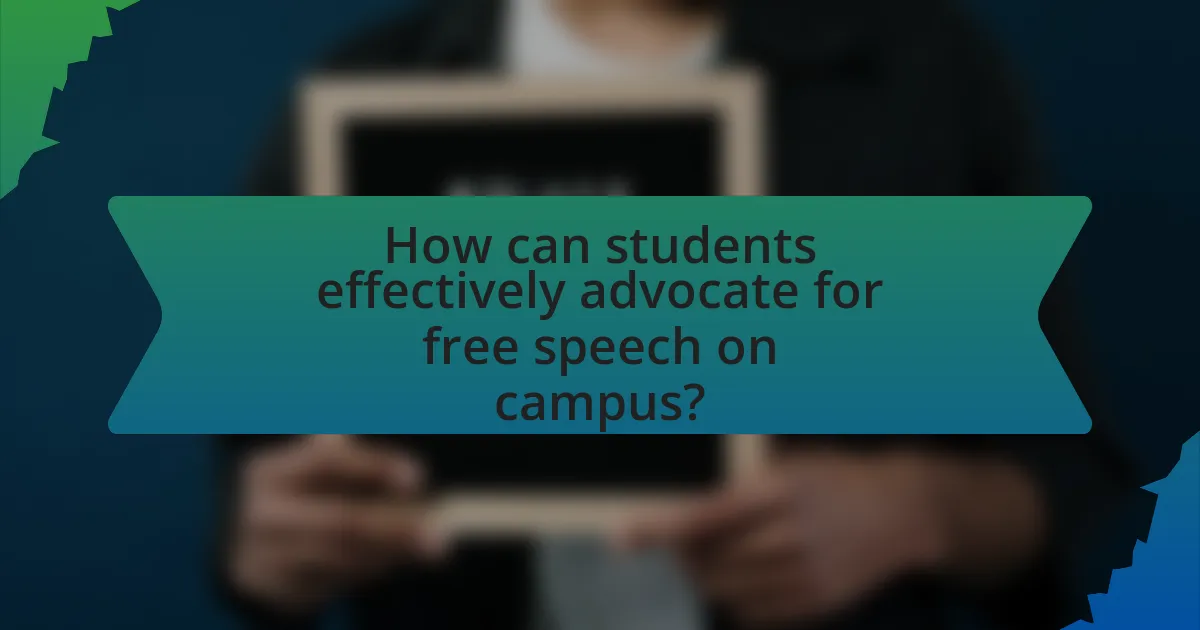
How can students effectively advocate for free speech on campus?
Students can effectively advocate for free speech on campus by organizing awareness campaigns, engaging in dialogue with administration, and forming coalitions with like-minded organizations. Awareness campaigns can include hosting events, distributing literature, and utilizing social media to highlight the importance of free speech. Engaging in dialogue with administration involves presenting well-researched arguments and data that demonstrate the value of free expression, such as the American Association of University Professors’ stance that free speech is essential for academic freedom. Forming coalitions with other student organizations amplifies their voice and creates a united front, which can lead to more significant impact and visibility on campus issues related to free speech.
What strategies can students employ to promote free speech?
Students can promote free speech by organizing forums and discussions that encourage open dialogue on controversial topics. These events create a platform for diverse viewpoints, fostering an environment where all voices can be heard. Research indicates that campuses with active debate programs report higher levels of student engagement and understanding of free speech principles. Additionally, students can advocate for policies that protect free speech rights, such as the adoption of the Chicago Statement on Principles of Free Expression, which emphasizes the importance of free inquiry and expression in academic settings. By participating in or initiating campaigns that raise awareness about free speech issues, students can mobilize their peers and influence institutional policies.
How can students engage with administration to address free speech concerns?
Students can engage with administration to address free speech concerns by organizing forums and discussions that facilitate open dialogue. These events allow students to present their perspectives and grievances directly to administrators, fostering a collaborative environment for addressing issues. Additionally, students can form advocacy groups that represent diverse viewpoints, ensuring that a wide range of opinions is considered in policy discussions. Research indicates that institutions that encourage student participation in governance often see improved communication and understanding regarding free speech policies. For example, a study by the Foundation for Individual Rights in Education highlights that campuses with active student engagement in policy-making tend to have clearer and more supportive free speech guidelines.
What role does education and awareness play in advocacy efforts?
Education and awareness are crucial in advocacy efforts as they empower individuals with knowledge and understanding of issues, enabling them to effectively engage in activism. By educating students about their rights and the importance of free speech, advocacy initiatives can foster informed dialogue and mobilize collective action. For instance, research from the American Association of University Professors indicates that campuses with robust educational programs on free speech see higher levels of student engagement in advocacy efforts. This demonstrates that informed individuals are more likely to participate actively in promoting and defending their rights, thereby enhancing the overall impact of advocacy campaigns.
What resources are available for students fighting for free speech?
Students fighting for free speech have access to various resources, including legal organizations, advocacy groups, and campus organizations. The Foundation for Individual Rights and Expression (FIRE) provides legal assistance and educational resources specifically aimed at protecting student free speech rights. Additionally, the American Civil Liberties Union (ACLU) offers support and guidance on free speech issues, including legal representation in cases of censorship. Campus groups, such as student government associations and free speech clubs, often organize events and campaigns to raise awareness and promote dialogue around free speech issues. These resources collectively empower students to advocate for their rights and navigate challenges related to free expression on campus.
Which organizations provide support for student activists?
Organizations that provide support for student activists include the American Civil Liberties Union (ACLU), which defends individual rights and freedoms, including free speech on campuses. Another key organization is Students for Liberty, which promotes liberty and free markets among students. The Foundation for Individual Rights in Education (FIRE) focuses specifically on protecting student rights, particularly in relation to free speech and due process. Additionally, the National Student Association (NSA) advocates for student interests and rights at various educational institutions. These organizations offer resources, legal assistance, and advocacy to empower student activists in their efforts.
How can students access legal resources related to free speech issues?
Students can access legal resources related to free speech issues through university legal aid offices, nonprofit organizations, and online databases. University legal aid offices often provide free consultations and resources tailored to student needs, while nonprofit organizations like the Foundation for Individual Rights in Education (FIRE) offer guides and legal assistance specifically focused on free speech rights on campuses. Additionally, online databases such as the American Civil Liberties Union (ACLU) website provide comprehensive information and legal resources regarding free speech issues, including case studies and legal precedents that support students’ rights.
What best practices should students follow in their activism?
Students should prioritize clear communication and collaboration in their activism. Effective activism requires articulating goals and messages clearly to engage peers and stakeholders. Collaboration with diverse groups enhances the impact of initiatives, as seen in movements like the March for Our Lives, which united students across various backgrounds to advocate for gun control. Additionally, students should utilize social media strategically to amplify their voices and reach wider audiences, as demonstrated by the #MeToo movement, which gained momentum through online platforms. Engaging in respectful dialogue and listening to differing viewpoints fosters a constructive environment for activism, promoting understanding and potential alliances. Lastly, students should educate themselves on relevant policies and legal rights regarding free speech on campus to navigate challenges effectively, ensuring their activism is informed and impactful.
